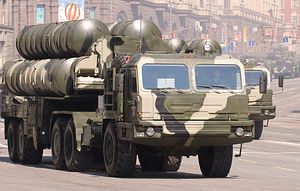China and Russia concluded an anti-ballistic missile defense computer-simulated command post exercise, codenamed Airspace Security 2017, on December 16.
According to the information bureau of China’s Ministry of Defense (MoD), the military drill, held from December 11 to 16 in Beijing, “achieved new breakthroughs in anti-missile cooperation.” The ministry neither revealed the nature of the purported ‘breakthroughs’ nor revealed the number of troops or specific units participating in the exercise.
The two military conducted joint exercises on the planning, command, and firepower coordination of air defense and anti-missile operations supported by computer simulations, the Chinese MoD said in a statement. Airspace Security 2017 also involved a number of lectures.
The joint exercise is “a pragmatic gesture of important mutual understanding in terms of bolstering Russian-Chinese cooperation in air defense reached by the two countries’ leaders,” the Chinese MoD noted in a press release last week.
“China and Russia oppose the development of a global anti-missile system and the cooperation on the anti-missile field would help protect both countries’ security as well as the regional strategic balance.”
Russia’s MoD said in a statement last week that the purpose of the drill is to test command and control mechanisms and swift joint responses to “accidental and inflammatory strikes of ballistic missiles.”
China and Russia are especially concerned about deployment of Terminal High Altitude Area Defense (THAAD) systems by the United States on the Korean Peninsula. As I reported last week:
The United States began deploying the first THAAD system in March 2017, which temporarily led to a diplomatic rift between South Korea and China.
Beijing and Moscow have called the deployment “reckless” and likely to destroy “the strategic balance” on the Korean Peninsula and in the region. They also criticized the recent U.S.-ROK-Japan missile defense exercise. “Carrying out military training in regions surrounding North Korea will only heighten hysteria and make the situation unstable,” Russian Chief of the General Staff of the Armed Forces General Valery Gerasimov said during a visit to Japan on December 11 (…)
Despite ostensible reported breakthroughs, the exercise will have likely had little impact on the operational readiness of Russian and Chinese anti-missile defense units as I explained in the previous week:
China and Russia have a comprehensive strategic partnership but not a military alliance. (…) This handicaps deeper military cooperation between the two countries and makes exercises that practice complex integrated military operations difficult if not impossible to conduct. (…)
The practical benefits of Airspace Security 2017 for both militaries are likely to be small. For example, it is unclear whether the exercise will involve trying to streamline intelligence-sharing mechanisms, including the real-time sharing of missile threat data, in order to better facilitate the detecting and tracking of incoming ballistic missiles.
Indeed, both sides repeatedly stress the non-alliance aspect of their military cooperation.
“The successful joint exercise by China and Russia is a positive effort made by the two countries to maintain common security interests and regional strategic balance, and also reflects the high level of China-Russian strategic and cooperative partnership,” China’s MoD said on December 16.
Airspace Security 2017 is the second such exercise held by China and Russia so far.
China is also in the process of inducting a number of of Russian-made S-400 Triumf advanced Air Defense Systems (NATO reporting name: SA-21 Growler).

































